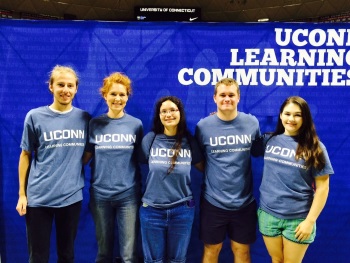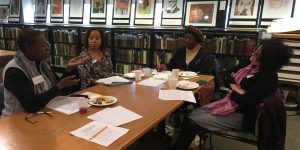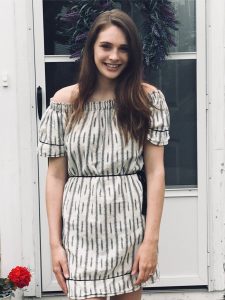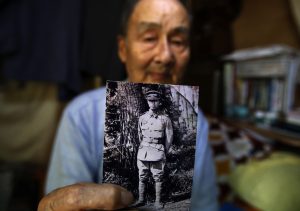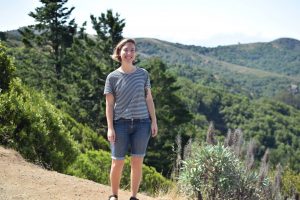For the summer of 2018, Luisa participated in the Smithsonian Latino Center’s Latino Museum Studies Program, which seeks out Latinx scholars whose scholarship connects the academy and museum’s work. With the objective of preparing the young scholars to work in museums that represent the Latino community and experience, the program places the graduate students in positions across the Smithsonian museums. Luisa worked directly with the Center and its Media Director, Melissa Carrillo, in a project called Latinos in the 21th Century: a Digital Experience. Luisa’s work involved: analyzing digital experiences and installations in D.C. museums to determine their public-engagement strategies; deconstructing the pre-phase of the Latino Gallery narrative content to unveil the ways in which it tells the Latino experience in the U.S; and developing a proposal for the entrance installation to the first Smithsonian Latino Gallery.
1) Could you describe what you observed in other installations and how the Smithsonian’s first Latino Gallery will compare?
The Smithsonian museums are attempting to engage more with their audiences while offering a more inclusive picture of the American nation. The National Portrait Gallery and the Museum of the American Indian represent, for me, the biggest efforts in that sense with exhibits such as UnSeen: Our Past in a New Light, Ken Gonzales-Day and Titus Kaphar and Americans, respectively. Nevertheless, I think the Latino Gallery will be pioneering the museum field when it comes to turning the audience from spectators to actors. By linking interactive installations with more inclusive museum practices, installations at the Latino Gallery will favor individuals as making-history agents whose history is worthy of being told within the museum space.
2) What skills from our doctoral program did you utilize during this internship?
Critical thinking. As a doctoral student, you are constantly asking yourself and your colleagues about the work you do, the role of human actors, and the importance of the historical context..
3) How did you hear about this opportunity?
My advisor, Mark Healey, sent to me an email about the Latino Museum Studies Program. Honestly, I thought it would be a long shot, but he was right. The program was perfect for me and I really loved the experience.
4) Could you expand upon your previous experience researching and/or working with underrepresented groups in Colombia’s national museum?
As a teenager, I worked with a UNESCO project that sought to facilitate the access of Afro-descendant people to historic places and monuments. My home city, Cartagena, is a touristic Caribbean center so being black and not having money really reduces your chances to enjoy the historic spaces that tourists can. However, while the project facilitated access, Afro-descendants and Indigenous were still not included in those stories or places. This experience impacted my undergraduate thesis on land legal cases between indigenous groups, white settlers, and the Spanish Crown prior to the Independence struggles of the 1820’s. I was interested in demonstrating how the lack of inclusion of indigenous groups within the national history is linked to their support of the Spanish Crown during that period.
At UConn, I have moved onto the representation of these groups – Afro-descendants, Indigenous, and women – within the National Museum in Colombia. I consider the objects and portraits introduced to the museum in 1880 and I argue that this process represents the simultaneous inclusion and exclusion of these groups. Many of the paintings have been visually modified to fit the image of the nation that the Colombian elites wished to portray. I seek to showcase that process so these groups, today, can understand how they have been pushed out of many places and stories, and maybe they would seek to regain them. Thus, my work has come full-circle from my teen years.
5) How did this opportunity impact the way you conceptualize your dissertation and/or future career? Would you be interested in working with the Smithsonian in the future?
The Latino Museum Studies Program helped me realize that there are spaces that are perfect for me in regards to what I want to do, both academically and personally. Specifically, I am interested in cultural work and public engagement, in reconnecting academy and community. I think that museums are perfect spaces for that. This is reflected in my dissertation that will utilize a comparative perspective to analyze the opening of the first gallery at the National Museum of American History to similar ones in Colombia. Regarding my future career, I would definitely consider working with the Smithsonian.
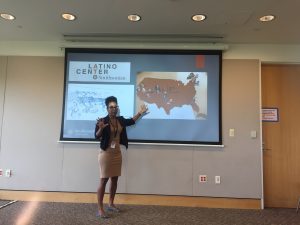
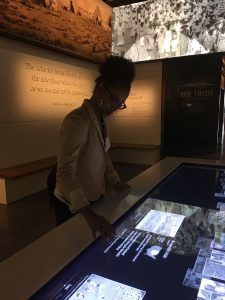
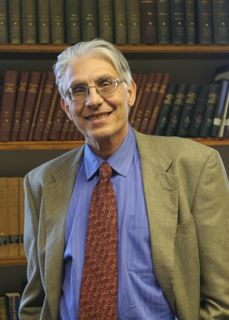 UConn Today recently interviewed Board of Trustees Distinguished Professor of History Frank Costigliola regarding the current state of U.S. foreign relations. Professor Costigliola compares Kennan’s writings to U.S.-Russia relations in the age of President Trump, historicizes and discusses the United States’ alliances, and predicts how the U.S. can rebuild allies’ trust.
UConn Today recently interviewed Board of Trustees Distinguished Professor of History Frank Costigliola regarding the current state of U.S. foreign relations. Professor Costigliola compares Kennan’s writings to U.S.-Russia relations in the age of President Trump, historicizes and discusses the United States’ alliances, and predicts how the U.S. can rebuild allies’ trust.